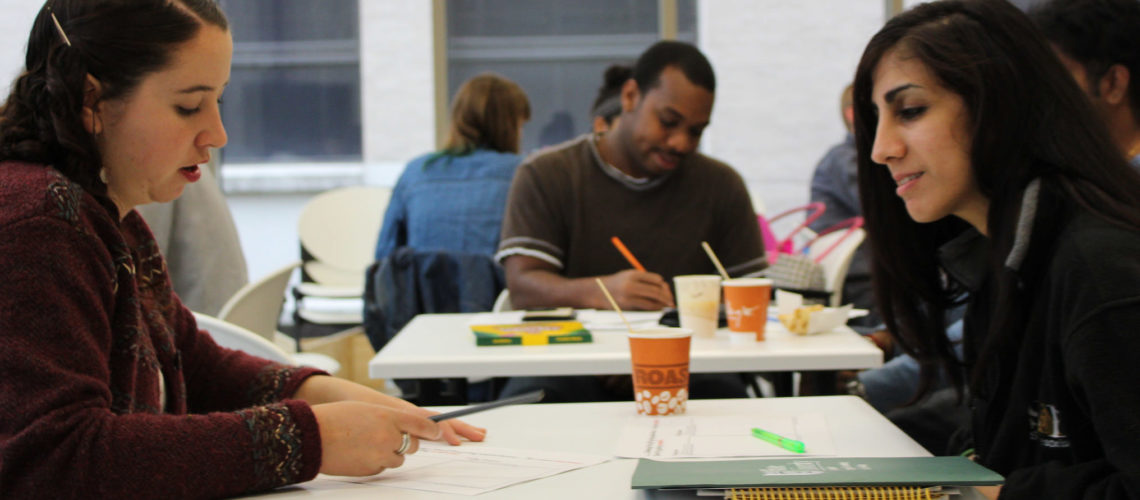
At Taylor, we aspire to practice persistent curiosity and recognize that everyone has knowledge to gain and share. Core terms that guide our work are below, which draw from classic articles and our work.
Social innovation is defined as a novel solution to a social problem that is more effective, efficient, sustainable, or just than existing solutions and for which the value created accrues primarily to society as a whole rather than private individuals. (Phills, Deiglmeier, & Miller, 2008)
Design thinking at Taylor is a human-centered approach to generating social innovations. We draw from the designer’s toolkits and mindsets to address the needs of people with new, creative, collaborative solutions. Design thinking in practice also acknowledge the possibilities of technology and the requirements for real-world success. (IDEO, Stanford d.school)
Changemakers are people who are taking creative action to solve a social problem for the greater good. (Ashoka )
Other Concepts to Consider
These terms may be used in SISE classes and you may find them in literature in the field.
Civic engagement means working to make a difference in the civic life of our communities and developing the combination of knowledge, skills, values, and motivation to make that difference. It means promoting the quality of life in a community, through both political and non-political processes. (Report on Civic Responsibility and Higher Education, 2000)
Collective impact is the commitment of a group of important actors from different sectors to a common agenda, shared measurement, continuous communication, and mutually reinforcing activities for solving a specific social problem. (Kania & Kramer, 2011)
Corporate social responsibility encompasses not only what companies do with their profits, but also how they make them. It goes beyond philanthropy and compliance and addresses how companies manage their economic, social, and environmental impacts, as well as their relationships in all key spheres of influence: the workplace, the marketplace, the supply chain, the community, and the public policy realm. (Harvard)
Critical thinking is the intellectually disciplined process of actively and skillfully conceptualizing, applying, analyzing, synthesizing, and/or evaluating information gathered from, or generated by, observation, experience, reflection, reasoning, or communication, as a guide to belief and action. (National Council for Excellence in Critical Thinking)
An intrapreneur is a person within an organization who takes direct responsibility for turning a new idea into reality. Intrapreneurship is now also part of a corporate management style that integrates risk-taking and innovation approaches, as well as the reward and motivational techniques that are more traditionally thought of as being the province of entrepreneurship. (Ashoka)
Service learning, is an educational experience based upon a collaborative partnership between the university and the community that enables students to apply academic knowledge and critical thinking skills to meet genuine community needs. Through reflection and assessment, students gain deeper understanding of course content and the importance of civic engagement. (Tulane Center for Public Service)
Social challenges are complex, pressing, and persistent problems that social innovators tackle here in New Orleans, in Louisiana, and around the world, in areas such as education, health, environmental conservation, financial exclusion, and more. Using human centered design and social entrepreneurial/intrapreneurial mindsets, we aim to turn complex problems into challenges that we creatively and optimistically face together.
A social enterprise is an organization or venture that achieves its primary social or environmental mission using business method. The social needs addressed by social enterprises and the business models they use are as diverse as human ingenuity. (SEA)
Social entrepreneurs focus on transforming systems and practices that cause poverty, marginalisation, environmental deterioration and loss of dignity. Socially entrepreneurial activity takes place across all fields, from health to climate change and education, and across all sectors, from non-profit to commercial and governmental. In partnership with institutions, networks and communities, social entrepreneurs create solutions that are efficient, sustainable, transparent and have measurable impact. Importantly, social entrepreneurs are focused on systems-changing initiatives that seek to address the root cause of the social problem rather than palliative activities.(Skoll Centre for Social Entrepreneurship )
Sustainable development. We work to promote ecologically sound, “sustainable” human development, i.e. to enhance and promote opportunities for all people to “do more and be more in ways that they have reason to value,” according to philosopher Amartya Sen and the United Nations Development Program (UNDP). This aim is consistent with expanding human rights everywhere, and eradicating poverty seen as deprivations of material, political, and intangible freedoms, not just lack of income. (Sen, UNDP)
Systemic change delves behind immediate problems, involves new ways of applying resources to underlying causes, and results in tangible and enduring benefits. It occurs when an outcome or goal has been attained and the subsequent result either eliminates the cause of the problem or alters programs, policies, funding streams and/or services to reduce the impact of the problem on a long-term basis. (Skoll Foundation)
Link:
